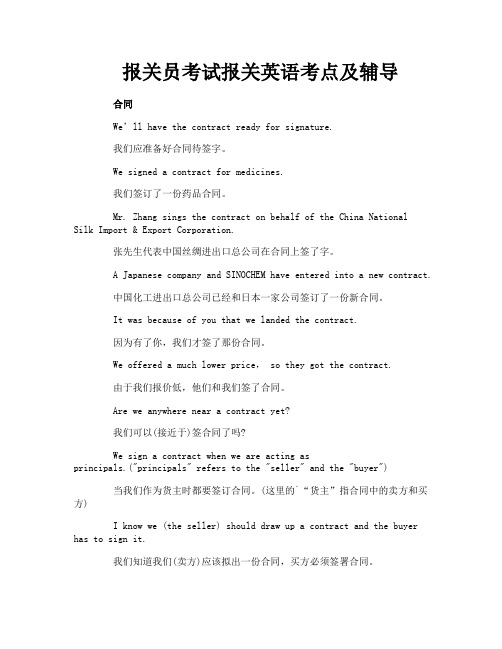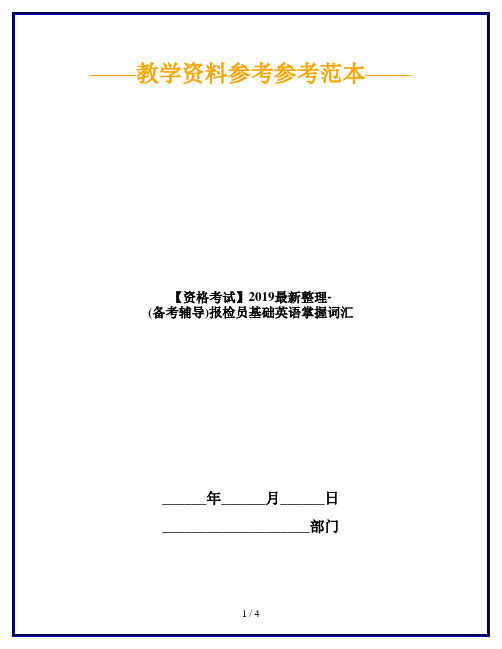报检员考试重点辅导:英语小结
机场安检英语知识点总结

机场安检英语知识点总结Airport security is an important aspect of air travel, designed to ensure the safety and security of passengers, crew, and aircraft. Airport security consists of various measures, including passenger screening, baggage screening, and other security protocols. It is essential for passengers to be aware of the rules and regulations related to airport security to ensure smooth and hassle-free travel.Passenger ScreeningPassenger screening is an essential part of airport security. It involves the inspection of passengers and their belongings to detect any prohibited items that may pose a threat to the safety of the aircraft. The screening process includes several steps, such as the use of metal detectors, X-ray scanners, and physical pat-downs.Metal DetectorsMetal detectors are commonly used in airport security to detect metal objects on a person's body. Passengers are required to walk through a metal detector, and if the detector indicates the presence of metal, further inspection is conducted to determine the nature of the object.X-ray ScannersX-ray scanners are used to screen passengers' carry-on luggage and personal items. Passengers are required to place their belongings on the conveyor belt for X-ray scanning, and security officers assess the images to identify any prohibited items, such as weapons, explosives, or other dangerous materials.Physical Pat-DownsIn some cases, passengers may be subject to a physical pat-down by security officers. This is typically done when the metal detector or X-ray scanner indicates the presence of a suspicious item, or when a passenger opts out of undergoing electronic screening.Prohibited ItemsPassengers are prohibited from carrying certain items onto an aircraft, as they pose a threat to safety and security. These items include:Weapons: Firearms, ammunition, and other lethal weapons are strictly prohibited in carry-on luggage. Some items may be allowed in checked baggage, subject to specific regulations and restrictions.Explosives: Any type of explosive material, including fireworks, flares, and other pyrotechnic devices, is prohibited in both carry-on and checked baggage.Liquids and Gels: Passengers are limited to carrying small quantities of liquids and gels in their carry-on luggage, with each container not exceeding 100 milliliters. These items must be placed in a resealable plastic bag and presented separately for security screening.Sharp Objects: Items such as knives, scissors, and other sharp objects are prohibited in carry-on luggage, with some exceptions for certain types of knives, provided they are properly packaged in checked baggage.Security ProtocolsIn addition to passenger screening, airports implement various security protocols to enhance safety and security. These protocols are designed to prevent unauthorized access to restricted areas, secure the perimeter of the airport, and respond to security incidents. Access ControlAccess control measures are implemented to regulate the movement of people and vehicles within the airport. This includes the use of identification badges, security checkpoints, and restricted access areas to prevent unauthorized entry into sensitive areas, such as aircraft gates, baggage handling facilities, and maintenance areas.Perimeter SecurityAirport perimeter security is crucial in preventing unauthorized access to the airfield and aircraft. Perimeter fences, surveillance cameras, motion sensors, and security patrols play a vital role in securing the outer boundaries of the airport and detecting any potential security threats.Emergency ResponseAirports have established emergency response plans to address security incidents, such as acts of terrorism, hijackings, or other threats to the safety of passengers and aircraft. These plans involve coordination with law enforcement agencies, emergency services, and airport authorities to respond effectively to security threats and ensure the safety of all individuals at the airport.Regulatory ComplianceAirport security measures are subject to strict regulations and international standards set by aviation authorities and governing bodies. These regulations govern the implementation of security measures, the training of security personnel, the handling of prohibited items, and the maintenance of security equipment to ensure compliance with safety and security requirements.ConclusionAirport security is a critical component of air travel, aimed at safeguarding passengers, crew, and aircraft from potential threats and security risks. It encompasses various measures,including passenger screening, baggage screening, and security protocols, to ensure the safety and security of all individuals at the airport. It is essential for passengers to be familiar with the rules and regulations related to airport security to facilitate a smooth and secure travel experience.。
报关员考试报关英语考点及辅导

报关员考试报关英语考点及辅导合同We’ll have the contract ready for signature.我们应准备好合同待签字。
We signed a contract for medicines.我们签订了一份药品合同。
Mr. Zhang sings the contract on behalf of the China NationalSilk Import & Export Corporation.张先生代表中国丝绸进出口总公司在合同上签了字。
A Japanese company and SINOCHEM have entered into a new contract.中国化工进出口总公司已经和日本一家公司签订了一份新合同。
It was because of you that we landed the contract.因为有了你,我们才签了那份合同。
We offered a much lower price, so they got the contract.由于我们报价低,他们和我们签了合同。
Are we anywhere near a contract yet?我们可以(接近于)签合同了吗?We sign a contract when we are acting asprincipals.("principals" refers to the "seller" and the "buyer")当我们作为货主时都要签订合同。
(这里的`“货主”指合同中的卖方和买方)I know we (the seller) should draw up a contract and the buyer has to sign it.我们知道我们(卖方)应该拟出一份合同,买方必须签署合同。
运输do you do any chartering?你们租船吗?If the cargo space must be reserved, please send us the necessary application forms.假如要预订货舱,请将订舱表寄给我们。
英语单招重点知识归纳总结

英语单招重点知识归纳总结在备战英语单招考试过程中,准备一份重点知识的归纳总结是非常重要的。
本文将针对英语单招考试的重点知识进行详细归纳总结,帮助考生系统地复习所需知识。
一、词汇1. 同义词和反义词的辨析:英语单招中经常考察考生对于同义词和反义词的辨析能力。
需要记忆和掌握常见的同义词和反义词,并能灵活运用。
2. 词汇拓展:考生需要能够通过上下文理解和推测词汇的含义,掌握词根、词缀的意义,从而拓展词汇量。
3. 高频词汇:英语单招考试涉及到大量的高频词汇,考生应该重点掌握并记忆这些词汇。
二、语法1. 时态:英语语法中最基础也是最重要的部分之一。
考生需要熟悉各种时态的构成和用法,包括一般现在时、一般过去时、一般将来时等。
2. 语态:能够正确理解和使用被动语态和主动语态。
需要掌握被动语态的构成及其在句子中的作用。
3. 从句:从句是英语语法中的重要部分,包括定语从句、名词性从句和状语从句。
考生需要熟练掌握从句的引导词和结构,能够准确理解和使用从句。
4. 并列连词:并列连词在句子中起到连接并列成分的作用。
考生需了解并掌握各类并列连词的用法,并能够正确地使用。
三、阅读理解1. 阅读技巧:阅读理解是英语单招考试中的重点,考生需要通过大量的练习来提高阅读理解的能力。
阅读时可以先浏览全文,抓住文章的结构和主旨,然后再细读每个段落。
2. 理解文章:考生需要培养良好的阅读习惯,注重理解文章的主题、中心思想以及作者的观点等。
3. 掌握词汇:考生需要通过阅读大量的英文文章来积累词汇,并能够根据上下文理解生词的含义。
四、写作技巧1. 熟悉写作题型:英语单招考试中常见的写作题型包括议论文、说明文和应用文等。
考生需要针对不同题型了解其特点和要求,并进行针对性的练习。
2. 组织结构:写作时需要注意文章的结构和组织,包括开头、主体和结尾。
文章结构要清晰合理,逻辑性强。
3. 语法和词汇:写作时需要注意语法的准确性和词汇的丰富性。
要注意使用正确的时态、语态和句型,以及恰当地使用高级词汇和短语。
【资格考试】2019最新整理-(备考辅导)报检员基础英语掌握词汇

cargo damage survey
cargo measurement and weighing
cholera
composite packaging(复合包nventional allowance
conventional packing
friction factor
fumigation
health certification mark
hygienic standard
infectious disease
jumbo bag(集装袋)
kraft paper(牛皮纸)
lash
lawful/legal inspection
mechanical property(机械性能)
——教学资料参考参考范本——
【资格考试】2019最新整理-(备考辅导)报检员基础英语掌握词汇
______年______月______日
____________________部门
AQSIQ General Administration of Quality Supervision, Inspection and Quarantine of the People’s Republic of China
CIQ China Inspection and Quarantine
CNCA Certification and Accreditation Adiminstration of People’s Republic of China
Hazard Analysts and Critical Control Points(HACCP)
rigid package(硬包装)
